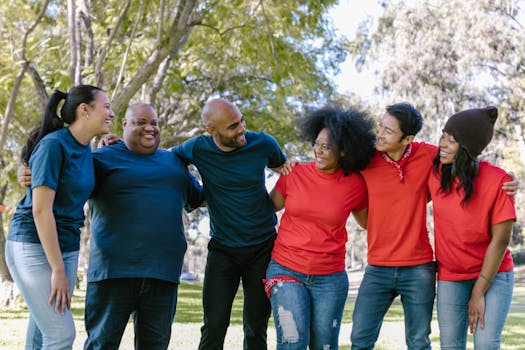Cultural exchange programs have become increasingly popular in today’s interconnected world, offering individuals the opportunity to immerse themselves in different cultures and gain a deeper understanding of global diversity. These programs foster cross-cultural understanding, promote tolerance, and provide a platform for people from diverse backgrounds to connect and learn from one another. In this article, we will explore the numerous benefits of cultural exchange programs, ranging from personal growth to enhanced language skills and a broader perspective on global issues.
- 1. Introduction
- 1.1. Definition of cultural exchange programs
- 1.2. Importance of cultural exchange programs
- 1.3. Benefits of participating in cultural exchange programs
- 1.4. Types of cultural exchange programs
- 1.5. Purpose of cultural exchange programs
- 2. Popular cultural exchange programs
- 2.1. Erasmus+ program
- 2.2. Fulbright program
- 2.3. AIESEC internships
- 2.4. World Learning’s Experiment programs
- 2.5. Rotary Youth Exchange program
- 3. How to participate in a cultural exchange program
1. Introduction
Cultural exchange programs have gained immense popularity in recent years, offering individuals the opportunity to immerse themselves in different cultures and gain a deeper understanding of the world around them. These programs promote cross-cultural communication, foster mutual respect, and create a platform for individuals to share their perspectives and experiences. By participating in cultural exchange programs, individuals can broaden their horizons, develop new skills, and build lifelong connections. In this article, we will explore the numerous benefits of cultural exchange programs, highlighting how they contribute to personal growth, global understanding, and the promotion of cultural diversity.
1.1. Definition of cultural exchange programs
Cultural exchange programs can be defined as initiatives that promote the exchange of cultural knowledge, ideas, and experiences between individuals or groups from different countries or regions. These programs aim to enhance cross-cultural understanding, foster mutual respect, and create opportunities for cultural immersion. Cultural exchange programs can take various forms, such as student exchange programs, work exchange programs, or cultural immersion programs. They provide participants with the chance to explore a different culture firsthand, engage with local communities, and develop a global perspective. Through cultural exchange programs, individuals can broaden their horizons, gain valuable insights into different ways of life, and forge meaningful connections with people from diverse backgrounds.
1.2. Importance of cultural exchange programs
Cultural exchange programs play a crucial role in fostering understanding and appreciation of different cultures. These programs provide individuals with the opportunity to immerse themselves in a foreign culture, learn about its traditions, language, and customs. By participating in cultural exchange programs, individuals can gain a deeper insight into the diversity of the world we live in and develop a broader perspective. Such programs also promote tolerance, empathy, and respect for other cultures, which are essential qualities in today’s globalized society. Additionally, cultural exchange programs contribute to personal growth, as they allow individuals to step out of their comfort zones and experience new ways of life. This exposure to different cultures can enhance one’s communication skills, adaptability, and open-mindedness. Overall, cultural exchange programs are invaluable in promoting cultural awareness, fostering global friendships, and creating a more interconnected and peaceful world.
1.3. Benefits of participating in cultural exchange programs
Cultural exchange programs offer a unique opportunity for individuals to immerse themselves in different cultures and gain a deeper understanding of the world around them. These programs provide participants with the chance to experience diverse traditions, languages, and customs firsthand, fostering personal growth and broadening their perspectives. Engaging in a cultural exchange program can have numerous benefits, ranging from enhanced intercultural communication skills to increased global awareness and empathy. In this article, we will explore the various advantages and rewards that come with participating in cultural exchange programs.
1.4. Types of cultural exchange programs
Cultural exchange programs offer a valuable opportunity for individuals to immerse themselves in a new culture, broaden their horizons, and gain a deeper understanding of different customs and traditions. These programs come in various forms, catering to different interests and goals. Here are some of the different types of cultural exchange programs:
1.5. Purpose of cultural exchange programs
Cultural exchange programs play a vital role in promoting understanding and appreciation of different cultures. These programs offer individuals from diverse backgrounds the opportunity to immerse themselves in a new culture, thereby fostering mutual respect and tolerance. Through cultural exchange, participants gain a deeper understanding of the customs, traditions, and values of other societies, which helps break down stereotypes and prejudices. This section will delve into the purpose and significance of cultural exchange programs in today’s globalized world.
2. Popular cultural exchange programs
Cultural exchange programs provide a platform for individuals from different countries to interact and learn about each other’s cultures. These programs aim to foster mutual understanding, promote cultural diversity, and encourage international cooperation. Popular cultural exchange programs include student exchange programs, work and travel programs, and volunteer exchange programs. These programs offer participants the opportunity to immerse themselves in a foreign culture, develop cross-cultural communication skills, and gain a global perspective. Through cultural exchange programs, individuals can expand their knowledge, broaden their horizons, and form lifelong connections with people from around the world.
2.1. Erasmus+ program
The Erasmus+ program is one of the most popular cultural exchange programs available for students and professionals. It offers participants the opportunity to study, train, gain work experience, and volunteer abroad. The program promotes international cooperation and understanding, as well as personal and professional development.
Erasmus+ supports various activities, including student mobility, staff exchanges, strategic partnerships, and capacity-building projects. It focuses on enhancing skills, fostering cultural diversity, and promoting active citizenship.
Through the Erasmus+ program, participants can immerse themselves in a different culture, learn a new language, and gain a global perspective. They have the chance to meet people from different backgrounds, exchange ideas, and build lasting connections. These experiences contribute to personal growth, intercultural competence, and a broader understanding of the world.
Moreover, the Erasmus+ program provides financial support to participants, making it more accessible and inclusive. It offers scholarships and grants for travel, accommodation, and living expenses, easing the financial burden of studying or working abroad.
In summary, the Erasmus+ program is an exceptional cultural exchange opportunity that enables individuals to broaden their horizons, acquire valuable skills, and embrace diversity. It fosters mutual understanding, tolerance, and open-mindedness, creating a more interconnected and harmonious world.
2.2. Fulbright program
The Fulbright program is one of the most popular cultural exchange programs in the world. It is a prestigious scholarship program that allows students, scholars, and professionals from different countries to study, teach, and conduct research in the United States. Established in 1946, the Fulbright program aims to promote mutual understanding and cultural exchange between the United States and other nations.
The Fulbright program offers various grants and scholarships, including the Fulbright Scholar Program, Fulbright Student Program, and Fulbright Foreign Language Teaching Assistant Program. These programs provide opportunities for individuals to immerse themselves in a new culture, learn a foreign language, and contribute to academic and cultural exchange.
Participants of the Fulbright program gain valuable experiences and skills that can have a significant impact on their personal and professional development. They have the chance to engage with diverse communities, build international networks, and foster cross-cultural understanding. Additionally, the program allows participants to broaden their perspectives, gain new insights, and develop a global mindset.
The Fulbright program not only benefits the individuals who participate but also strengthens diplomatic relations between nations. By fostering cultural exchange and dialogue, it helps to break down stereotypes, promote tolerance, and build bridges of understanding. The program plays a crucial role in promoting peace, cooperation, and collaboration among nations.
In conclusion, the Fulbright program is a highly regarded cultural exchange program that provides individuals with unique opportunities to expand their horizons, understand different cultures, and contribute to international understanding and collaboration.
2.3. AIESEC internships
AIESEC internships are among the most popular cultural exchange programs available today. AIESEC, which stands for Association Internationale des Étudiants en Sciences Économiques et Commerciales, is the world’s largest student-run organization. It offers international internships to young people from around the globe, providing them with valuable opportunities to gain practical work experience while immersing themselves in a foreign culture.
AIESEC internships are known for their focus on professional development, cultural understanding, and global leadership. Participants have the chance to work in various fields such as business, education, social development, and entrepreneurship. These internships allow individuals to enhance their skills, broaden their perspectives, and develop a global mindset that is crucial in today’s interconnected world.
One of the key benefits of AIESEC internships is the chance to engage in cross-cultural exchange. Participants not only work in a foreign country but also live with local hosts, enabling them to experience the daily life, traditions, and customs of the host culture. This immersive experience helps foster a deeper appreciation and understanding of different cultures, ultimately promoting tolerance, empathy, and respect.
Moreover, AIESEC internships encourage personal growth and self-discovery. Living and working in a foreign environment can be challenging, but it also presents opportunities for participants to step out of their comfort zones, overcome obstacles, and develop valuable life skills such as adaptability, resilience, and intercultural communication.
In addition to the personal and professional benefits, AIESEC internships contribute to the development of global citizens. By fostering international cooperation and understanding, these programs play a crucial role in building a more interconnected and peaceful world. Participants of AIESEC internships become ambassadors of their home countries, promoting cultural exchange and dialogue both during and after their internships.
In conclusion, AIESEC internships are highly sought-after cultural exchange programs that offer numerous benefits. From professional development to personal growth and global citizenship, these internships provide young individuals with a transformative experience that helps shape their future careers and perspectives in a rapidly changing world.
2.4. World Learning’s Experiment programs
World Learning’s Experiment programs offer a range of popular cultural exchange programs. These programs provide unique opportunities for individuals to immerse themselves in different cultures, expand their global perspectives, and develop lifelong connections. Cultural exchange programs foster mutual understanding and appreciation among participants from diverse backgrounds. Through these programs, participants gain valuable insights into different cultural practices, traditions, and ways of life. They also develop cross-cultural communication skills, adaptability, and intercultural competence. Popular cultural exchange programs include language immersion programs, homestay programs, volunteer programs, and academic exchange programs. These programs not only enrich participants’ personal and professional lives but also contribute to building a more interconnected and tolerant world.
2.5. Rotary Youth Exchange program
The Rotary Youth Exchange program is one of the most popular cultural exchange programs available for young people. This program allows students to spend a year studying abroad in a different country, immersing themselves in a new culture and gaining valuable life experiences. The Rotary Youth Exchange program is open to students aged 15 to 19 and is organized by Rotary International, a global network of community leaders dedicated to making a positive impact in the world.
Participating in the Rotary Youth Exchange program offers numerous benefits. Firstly, it allows students to develop a deeper understanding and appreciation for different cultures. By living with a host family and attending school in a foreign country, participants have the opportunity to learn about local traditions, customs, and values firsthand.
Additionally, the program helps foster lifelong friendships and connections. Students not only become close with their host families but also have the chance to meet other exchange students from around the world. These relationships can lead to future travel opportunities, networking, and even potential career paths.
Moreover, the Rotary Youth Exchange program promotes personal growth and independence. Living in a foreign country challenges students to adapt to new situations, overcome language barriers, and develop problem-solving skills. This experience helps build resilience, self-confidence, and a global mindset, which are highly valued in today’s interconnected world.
In conclusion, the Rotary Youth Exchange program is a highly regarded cultural exchange program that offers young people the chance to expand their horizons and gain invaluable cross-cultural experiences. By participating in this program, students can enhance their understanding of different cultures, forge lifelong friendships, and develop essential skills for personal and professional growth.
3. How to participate in a cultural exchange program
Participating in a cultural exchange program can be a rewarding and enriching experience. It allows individuals to immerse themselves in a different culture, learn about its customs and traditions, and develop a greater understanding and appreciation for diversity. To participate in a cultural exchange program, there are several steps to follow.
Firstly, research different cultural exchange programs that are available. Look for programs that align with your interests and goals. Consider factors such as the duration of the program, the location, and the specific cultural experiences offered.
Once you have identified a program that interests you, carefully review the application requirements. These may include submitting an application form, providing references, and possibly attending an interview. Take the time to prepare all the necessary documents and ensure that you meet the eligibility criteria.
Next, if needed, apply for any necessary visas or permits. Depending on the country and the duration of your stay, you may need to obtain a visa or permit to participate in the cultural exchange program. Research the specific requirements and allow yourself plenty of time to complete the application process.
After securing your place in the program, it is important to prepare yourself mentally and emotionally for the experience. Learn as much as you can about the culture, history, and customs of the destination country. This will help you adapt more easily and make the most out of your cultural exchange experience.
Finally, make the necessary travel arrangements. Book your flights, arrange accommodation, and ensure that you have all the required travel documents. It is also helpful to connect with other participants or alumni of the program to gather insights and tips.
Participating in a cultural exchange program can be a life-changing adventure. It provides an opportunity to broaden your horizons, develop new skills, and foster meaningful connections with people from different backgrounds. By following these steps, you can embark on a successful cultural exchange journey.
3.1. Research available programs
When looking to participate in a cultural exchange program, it is essential to research the available programs thoroughly. There are numerous organizations and institutions that offer cultural exchange opportunities, each with its own specific focus and requirements. By conducting proper research, individuals can find a program that aligns with their interests, goals, and desired outcomes.
Start by exploring reputable organizations that specialize in cultural exchange programs. Some well-known organizations include AFS Intercultural Programs, Cultural Vistas, and Youth For Understanding. These organizations have established networks and partnerships worldwide, offering a wide range of exchange opportunities for individuals of all ages and backgrounds.
Consider the program’s duration and location. Cultural exchange programs can vary in length, from short-term summer programs to year-long academic exchanges. Additionally, they can take place in various countries around the world. It is important to determine the duration and location that best suits your availability and preferences.
Evaluate the program’s focus and activities. Cultural exchange programs can focus on various aspects, such as language immersion, community service, or academic studies. Determine the specific focus of the program and assess if it aligns with your interests and goals. Additionally, research the activities and experiences included in the program to ensure they provide the type of cultural immersion you desire.
Check the program’s eligibility requirements. Different programs may have specific eligibility criteria, such as age restrictions, language proficiency requirements, or educational background prerequisites. Carefully review these requirements to ensure you meet them before applying.
Read reviews and testimonials from previous participants. This can provide valuable insights into the program’s quality, organization, and overall experience. Look for reviews that highlight the program’s positive aspects and consider any potential drawbacks mentioned.
Lastly, consider the costs associated with participating in a cultural exchange program. Some programs may offer scholarships or financial aid options, while others require participants to cover the expenses themselves. Take into account the program fees, travel costs, accommodation, and any additional expenses that may arise during the exchange.
By conducting thorough research on available cultural exchange programs, individuals can make an informed decision and find the program that best suits their interests and goals. This preparation will enhance the overall experience and maximize the benefits gained from participating in a cultural exchange program.
3.2. Contact program coordinators
To participate in a cultural exchange program, it is important to reach out to program coordinators who are responsible for organizing such programs. These coordinators can provide valuable information and guidance on how to get involved.
To begin, research various cultural exchange programs that interest you. Look for programs that align with your personal interests, goals, and availability. There are several organizations and institutions that offer cultural exchange programs, such as universities, non-profit organizations, and government agencies.
Once you have identified a program or several programs that appeal to you, find the contact information of the program coordinators. This can usually be found on the program’s website or through online directories. Alternatively, you can reach out to the organization directly and ask for the contact details of the program coordinators.
When contacting the program coordinators, it is important to express your interest in participating in their cultural exchange program. Provide a brief introduction about yourself, including your background, education, and any relevant experiences or skills. This will help the coordinators understand your suitability for the program.
Inquire about the application process and any specific requirements or qualifications needed to participate in the program. Program coordinators can provide detailed information about deadlines, application forms, fees, and any necessary documents. They may also be able to answer any questions or concerns you have about the program.
Additionally, ask about the duration of the program, the location(s) where the exchange will take place, and the activities and cultural experiences that participants can expect. Understanding these details will help you make an informed decision about which program is the best fit for you.
Lastly, thank the program coordinators for their time and consideration. It is important to maintain a professional and courteous attitude throughout the communication process. Be prepared to follow any instructions provided by the coordinators and submit the required documents within the specified deadlines.
By contacting program coordinators and following their guidance, you can successfully participate in a cultural exchange program and enjoy the numerous benefits it offers.
3.3. Submit application requirements
To participate in a cultural exchange program, applicants must submit certain application requirements. These requirements may vary depending on the specific program and organization facilitating it. However, there are some common elements that are typically required.
1. Application Form: The first step is to complete and submit the official application form provided by the program. This form will require personal information, educational background, and other relevant details.
2. Resume/CV: Applicants are usually required to provide a comprehensive resume or curriculum vitae (CV) highlighting their education, work experience, skills, and any relevant achievements.
3. Personal Statement: A personal statement is often required to assess the applicant’s motivation, goals, cultural awareness, and suitability for the program. This statement should articulate why the applicant is interested in participating in a cultural exchange program and how they believe it will benefit them.
4. Letters of Recommendation: Most programs require applicants to submit letters of recommendation from professors, employers, or other reputable individuals who can provide insight into the applicant’s character, skills, and potential.
5. Academic Transcripts: Applicants may need to provide official transcripts or academic records to demonstrate their educational background and performance.
6. Language Proficiency: Depending on the program, applicants may be required to demonstrate proficiency in the language of the host country. This can be done through standardized language tests or other means.
7. Health and Travel Insurance: Some programs may require applicants to have health and travel insurance coverage for the duration of their participation.
8. Application Fee: It is common for cultural exchange programs to charge an application fee to cover administrative costs.
It is important for applicants to carefully review the specific requirements of the program they are interested in and ensure that all necessary documents and information are provided accurately and within the specified deadlines.
3.4. Prepare for interviews
Participating in a cultural exchange program can be a transformative experience, providing individuals with an opportunity to immerse themselves in a different culture and gain a deeper understanding of its customs, traditions, and way of life. However, before embarking on such a program, it is essential to adequately prepare for the interviews that are typically conducted as part of the application process.
To increase your chances of being selected for a cultural exchange program, here are some tips on how to ace the interviews:
1. Research the program: Familiarize yourself with the cultural exchange program you are applying for. Learn about its goals, objectives, and the countries involved. This will demonstrate your genuine interest and commitment.
2. Understand the cultural context: Gain knowledge about the culture of the country you aspire to visit. Read books, watch documentaries, and engage with individuals from that culture to develop a nuanced understanding.
3. Reflect on your motivations: Consider why you want to participate in a cultural exchange program and what you hope to gain from the experience. Be prepared to articulate your motivations clearly during the interview.
4. Highlight relevant experiences: Think about any previous experiences that have exposed you to cross-cultural interactions, such as traveling, volunteering, or participating in multicultural events. These experiences can demonstrate your adaptability and open-mindedness.
5. Practice self-reflection: Reflect on your own cultural identity and how it may influence your interactions with individuals from different backgrounds. Be open to learning and challenging any preconceived notions or biases.
6. Develop intercultural communication skills: Effective communication is crucial in a cultural exchange program. Practice active listening, empathy, and the ability to adapt your communication style to different cultural norms.
7. Be open-minded and flexible: Cultural exchange programs often require individuals to step out of their comfort zones and embrace new experiences. Show your willingness to adapt, learn, and grow during the interview.
By adequately preparing for the interviews, you can demonstrate your enthusiasm, cultural sensitivity, and readiness to embark on a cultural exchange program. This will greatly enhance your chances of being selected and ensure a fulfilling experience.
3.5. Complete necessary paperwork
To participate in a cultural exchange program, there are certain necessary paperwork and steps that need to be completed. These requirements ensure a smooth and successful application process. Here are some key steps to follow:
1. Research and select a cultural exchange program: Start by exploring different cultural exchange programs available. Consider factors such as the program’s duration, location, and specific cultural activities offered.
2. Check eligibility criteria: Once you have selected a program, carefully review the eligibility criteria. This may include age restrictions, educational qualifications, language proficiency, and any specific requirements related to the program’s focus.
3. Prepare your application documents: Gather all the necessary documents required for the application. These typically include a completed application form, a copy of your passport, resume or CV, letters of recommendation, and a statement of purpose outlining your motivations and goals for participating in the cultural exchange program.
4. Financial arrangements: Determine the financial aspects of the program, including any fees, expenses, or scholarships available. Make sure you have a clear understanding of the costs involved and plan your budget accordingly.
5. Obtain necessary visas and permits: Depending on the program and destination country, you may need to apply for a visa or permit. Research the visa requirements and allow sufficient time for the application process.
6. Submit your application: Once you have completed all the necessary paperwork and gathered the required documents, submit your application within the specified deadline. Ensure that all forms are properly filled out and all supporting documents are included.
7. Attend interviews or orientations: Some cultural exchange programs may require interviews or orientations as part of the selection process. Prepare for these by researching common interview questions and familiarizing yourself with the program’s goals and objectives.
8. Await notification: After submitting your application, patiently wait for the program’s decision. This process may take some time, so it’s important to remain patient and optimistic.
By completing these necessary paperwork and following the required steps, you can increase your chances of successfully participating in a cultural exchange program.
Conclusion
In conclusion, cultural exchange programs offer numerous benefits, including promoting global understanding and tolerance, fostering personal growth and development, and expanding one’s worldview. These programs provide opportunities for individuals to immerse themselves in different cultures, learn new languages, and build lifelong friendships. By participating in cultural exchange programs, individuals can gain a deeper appreciation and respect for diverse cultures, contributing to a more interconnected and harmonious world.




